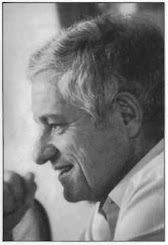Welcome
T H E...B O O K S...O F...A R N O...G R U E N...A V A I L A B L E...I N...E N G L I S H
The Insanity of Normality
Toward Understanding Human Destructiveness
Toward Understanding Human Destructiveness
This landmark book on the origins of violence is now available in paperback.

In The Insanity of Normality, the psychoanalyst Arno Gruen challenges the assumption, made popular by Freud in the twentieth century, that humans are born with an innate tendency to destruction and violence. Gruen argues instead that at the root of evil lies self-hatred, a rage originating in a self-betrayal that begins in childhood, when autonomy is surrendered in exchange for the "love" of those who wield power over us. To share in that subjugating power, we create a false self, a pleasing- to-others image of ourselves that springs from powerful and deep-seated hopes of being loved and fears of being injured and humiliated.
Gruen traces this pattern of over-adaptation and smoldering rebellion through a number of case studies, sociological phenomena - from Nazism to Reaganomics - and literary works. The insanity this attitude produces, unfortunately, goes widely unrecognized precisely because it is the same cold, manipulative "realism" that modern society inculcates into its members. Gruen warns, however, that escape from this pattern lies not simply in rebellion, for the rebel remains emotionally tied to the object of his rebellion, but in the development of a personal autonomy. His elegant and far-reaching conclusion is that while autonomy is not easily attained, its absence proves catastrophic to both individual and society.
"With compassion and conviction Dr. Gruen carefully exposes the undiagnosed and undisclosed insanity unwittingly accepted as normality... This is a text for leaders and followers, for conformists and rebels alike, for members of the healing professions who seek to repair the destructive fallout from our pursuit of normality and for all who strive for a more compassionate and saner social order." --Montague Ullman, M.D.
About Arno Gruen
Dr. Arno Gruen was born in Berlin in 1923 and emigrated to the United States as a child in 1936. After completing his graduate studies in psychology at New York University, he trained in psychoanalysis under Theodor Reik. Dr. Gruen has held many teaching posts, including seventeen years as professor of psychology at Rutgers University. Since 1979 he has lived and practiced in Switzerland. Widely published in German, his groundbreaking first book to be released in English, The Betrayal of the Self, was published by Grove Press in 1988. (Republished by Human Development Books in 2007.)
Love or power -- these are the opposing poles of a choice every child is compelled to make, very early in life, in a drama that has a deep and lasting influence on the person's path through life. This startling new insight into a formative experience fundamental to our development is the subject of Dr. Arno Gruen's pathbreaking contribution to the psychoanalytic view of the human soul, and what distorts it into pathology.
What happens to an infant when it learns that the love it craves from its parents is available only at the price of submission to their will? In paying this price, as Dr. Gruen found in many years of experience with his patients, the infant renounces its true, autonomous self and instead embarks on a search for power with which to manipulate the world around it -- a quest that will henceforth rule its life.
Dr. Gruen maps out the process by which this striving for power, once the fatal choice has been made, masks the child's inner emptiness, dulls its fears, and soothes its secret feelings of self-loathing. Its need for power soon bars all access to its real emotions, and corrupts all of its relationships into ones based on mastery and domination. The power-oriented world around it, which puts a premium on stoic "strength" and "invulnerability," further confirms the child in this pursuit of power, leading it on to a path of dehumanization which pervades our entire society. Thus human destructiveness and evil are not innate, but develop in a complex process of growth marked by the failure to attain autonomy.
In contrast, Gruen defines autonomy as that state of integration in which we live in full harmony with our feelings and needs. It is a natural state of being experienced in early childhood when the infant is loved unconditionally and without the need to earn this love by the self-sacrifice of submission.. It allows the child to remain vulnerable to feelings of self-doubt, helplessness, pain, and rage -- the very emotions the infant fearfully flees in its decision to betray its own self. The fear of these emotions, Dr. Gruen shows, alienates the male in particular, destroying his soul, depriving him of his ability to love, and imposing on him the need to oppress others, women especially.
How can therapy help the patient to find the way back to health and his autonomous self? Dr. Gruen discovered the clue to the therapeutic process in the active role the patient originally played in his choice between love and power, when he took refuge in power in his flight from pain. The therapist's task in helping the patient is to teach him how to accept the vulnerability he once feared in order to recover his lost autonomy.
By defining man's vulnerability as his strength, Gruen points the way to a psychoanalysis of personal courage and social responsibility. At the same time, by exposing the childhood split which leads man to abandon his true self, Gruen has written a powerful indictment of our modern culture which mirrors the individual's self-alienation in growing social violence and loss of humanity. (notes from book jacket, 1988 edition)
REPUBLISHED DECEMBER 2007. CLICK HERE TO ORDER ONLINE.
Review of The Betrayal of the Self:
Let's Have Some Hugs for John Sununu by Donella Meadows
an ecological meditation on The Betrayal of the Self
an ecological meditation on The Betrayal of the Self


